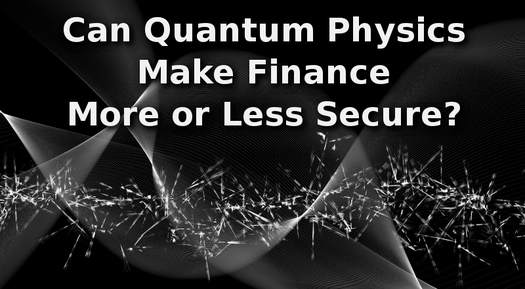 Data is critical to finance. Many people are familiar with the concept of encryption. The basic idea is that before data is sent over the internet, it is scrambled. The receiving party can un-scamble the data using an encryption key. The vast majority of time this systems works well because the encryption key is a very large semi-prime number (two prime numbers multiplied together.) Click here to read more about encryption. One of the weak-points of traditional encryption is the semi-prime number key. If an organization intercepted the scrambled data and had a super-computer handy, they could try to determine the encryption key by multiply random semi-prime numbers together until they found the key. Even then... this would take a long time. Quantum computing changes this entire situation. Quantum computing uses physics to create computers that are exponentially more powerful than today's traditional supercomputers. According to industry experts, quantum computers can break traditional encryption instantly. How? Quantum computers are unique... they operate at close to absolute zero, they use Qubits and they have multiple computing states. Were traditional computers utilize only two states (one and zero) to conduct calculations, quantum computer use qubits which leverage quantum superposition. This means that two or more qubits can work together and have multiple computing states such as 00, 01, 10, 11... The best part is that qubit can be one, many or all of these states at the same time. This is the break through. Furthermore, each additional qubit doubles the quantum computer's computing capacity... 2^2 = 4 states, three qubits is 2^3 = 8 states, four qubits is 2^4 = 16 states, and on and on.... (click her to read more) As of January 25th, 2019, the most powerful quantum computer has 79 qubits... 2^79 = 604,462,909,807,314,587,353,088. In order to protect against semi-prime key encryption hacking, Jeremy Kahn of Bloomberg reports that several financial services firms are test a new form of encryption called quantum key distribution. This type of encryption does not rely on semi-prime number keys and it can detect if someone is attempting to intercept the transmitted data. It's worth your time to read Jeremy's article titled, "The Super-Secure Quantum Cable in the Holland Tunnel." It's a very interesting read. It's clear that quantum computers are a threat to traditional encryption methods and can also provide a potential solution with quantum key distribution. So, can quantum physics make finance more or less secure? Perhaps the answer is, not unlike qubits, both simultaneously. What are your thoughts? Please comment below. Thanks. About the Author Daniel J. Carmody, CTP is the Executive Director of TreaSolution and a faculty member at Northwestern University. TreaSolution is a corporate finance consulting and training company headquartered in Chicago, Illinois. In addition to providing strategic finance consulting services, TreaSolution regularly hosts professional education training events such as the Treasury Boot Camp and the U.S. Fintech Symposium. At Northwestern University, Dan teaches a high-rated Certified Treasury Professional course.
0 Comments
|
About
No hype... just intelligent conversations about financial technology. Archives
October 2020
Categories
All
|

 RSS Feed
RSS Feed